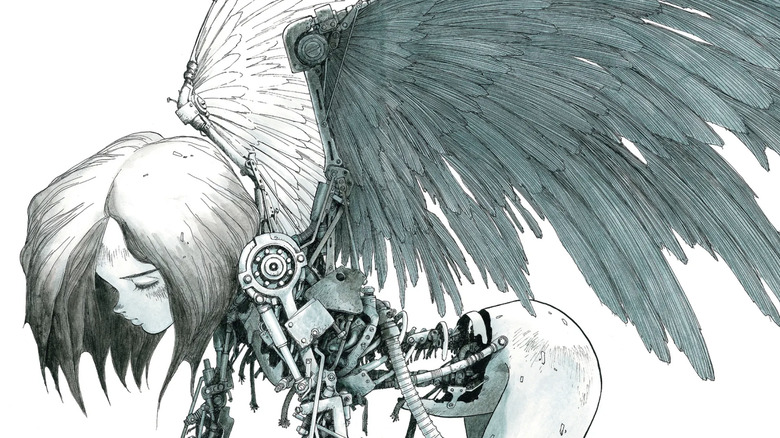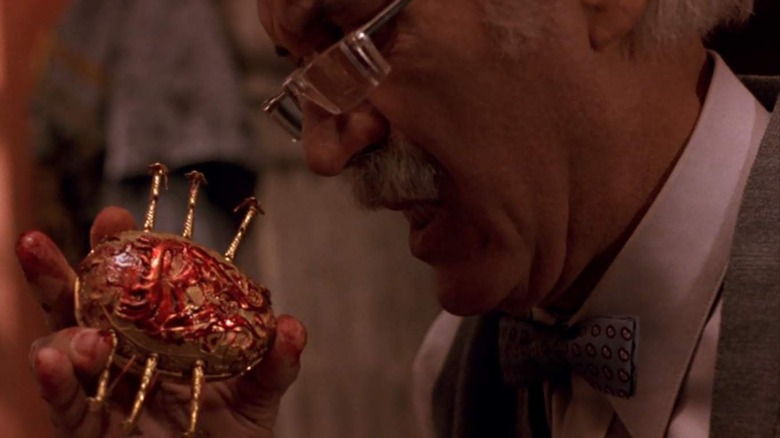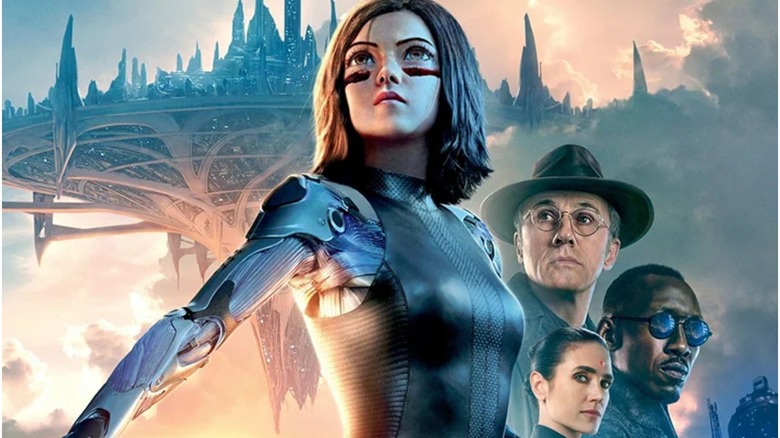Guillermo Del Toro Played A Crucial Role In Bringing Alita: Battle Angel To The Big Screen
Many people deserve credit for bringing "Alita: Battle Angel" to the big screen. James Cameron spent years developing the film and remained on as a producer even as plans to direct fell through. Robert Rodriguez ultimately directed the final film at Cameron's behest. Rosa Salazar delivered such a powerful lead performance that it defied the uncanny valley. Yukito Kishiro is the mangaka of the source material, "Battle Angel Alita/Gunnm." Someone else played a critical role in the film's conception yet went uncredited: Guillermo del Toro. It was him who introduced Cameron to Kishiro's manga.
How Cameron and del Toro met
In the early 1990s, Guillermo del Toro was an unknown. All he had to his name were a couple of short films. James Cameron, on the other hand, was on top of the world, thanks to "Terminator 2: Judgment Day." According to Uproxx, they met at a Fourth of July party while del Toro was preparing to produce his first feature, "Cronos." In 1997, del Toro's father, Federico, was kidnapped. Cameron came to Guillermo's aid, giving him $1 million in ransom money from his personal bank account and recommending a hostage negotiator.
In 1999, del Toro introduced Cameron to the "Battle Angel" manga, and the director was instantly taken with Kishiro's story. It's easy to see why; "Alita" has a lot of overlap with "Terminator." Both stories involve dystopian futures where the lines between man and machine are blurred, while the leads are both women in doomed romances who go from frail to kickass warriors. Just one year later in June 2000, Cameron and 20th Century Fox registered the domain name "battleangelalita.com." According to del Toro, he was involved in the early development of the project, though he didn't reveal why he left. Regardless, it took many more years for the film to be realized.
Decades of development hell
James Cameron often takes long gaps between his films, while Guillermo del Toro's projects have an unfortunate tendency to get stuck in development hell. The curses collided on "Alita," which spent 19 years in development. One reason is Cameron kept getting sidetracked by other projects, from his TV series "Dark Angel" to the documentary "Aliens of the Deep," and a little movie you may have heard of called "Avatar."
Cameron had waited many years to make "Avatar," telling the Los Angeles Times, "It was just too ambitious. But now the technology has caught up." According to an interview with NPR, the plan to bring Alita herself to life with CG animation was in place as early as 2003. It's plausible that Cameron was likewise waiting for the technology to catch up for "Battle Angel."
In an interview with MTV, Cameron revealed he prioritized "Avatar" because he felt the film's environmental themes could have a positive real-world impact, whereas "Alita" was just "a great, kick-ass story." In the same interview, he said he didn't want to hand the project over to another director, but he also didn't want to "take it to [his] grave either." This latter impulse won out, and Cameron recruited Robert Rodriguez to fill in as director in 2015.
Although del Toro had no involvement in the final production, he got his chance at a live-action anime with "Pacific Rim," a love letter to mecha and kaiju. Both "Alita" and "Pacific Rim" are models for how anime can be translated to live action — and proof there's still a place for sincerity in Hollywood blockbusters.


